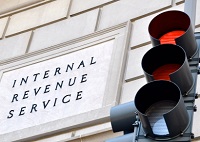The Court of Appeals for the District of Columbia has ruled that a lawsuit brought by True the Vote, a conservative vote-monitoring organization that supports voter ID laws (ostensibly to prevent voter fraud) may proceed against the IRS. True the Vote was one of several “tea party” organizations that when applying for exempt status several years ago was singled out for extra scrutiny.
In a May 14, 2013 report by the Treasury Inspector General for Tax Administration, the IRS was found to have used inappropriate criteria to identify tax-exempt applications for additional review, which gave the appearance that the IRS was not impartial in conducting its mission. During this time, it was proven that the IRS based its decisions to review applications on the names of the organizations, especially those that had the words “tea party” in them, as well as on the conservative policy positions of the organizations.
At issue in the True the Vote case (as well as in the Linchpins of Liberty case, involving another conservative exempt organization with similar IRS issues), was whether the taxpayer could seek declaratory judgment and injunctive relief for the IRS’ targeting scheme given that the IRS had stopped using its inappropriate screening criteria for tax-exempt status applications. The lower court’s ruling held that the issue was moot due to the fact that the IRS had “voluntarily ceased” the inappropriate conduct at issue. Further, the IRS had demonstrated that there was no reasonable expectation that the conduct would recur and that the effects of the inappropriate conduct had been completely and irrevocably eradicated.
The Circuit Court disagreed with the District Court’s finding, stating that currently there are still two conservative organizations awaiting IRS determination of their exempt status because the IRS had put their applications on hold when they filed suit, which is evidence that the effects of the conduct had not been eradicated. The Court said “it is not at all clear why the IRS proposes that not ceasing becomes cessation if the victim of the conduct is litigating against it.” Thus, the issue was not moot and the case was remanded back to the District Court for a full hearing on the merits of the petition for declaratory judgment and injunctive relief.
For more history and information about the IRS controversy, see our previous blog posts:
IRS Approves Crossroads GPS as Exempt 501(c)(4) After Six Years
Controversy at IRS Continues to Churn
IRS Bombshell: Political Screening of Conservative Organizations Underscores Larger Problems in Determination Process


